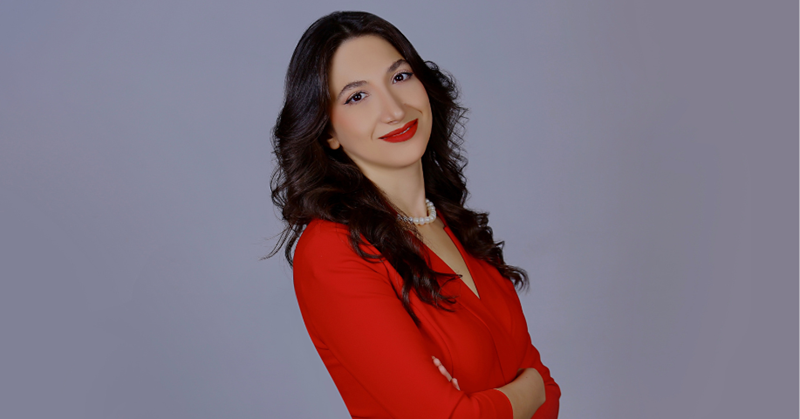
Driven by a passion for professional excellence and success, neurologist Lujain Jumran has navigated her medical studies, moving and working in new countries, and is now aiming to advance her career in the UK.
A passion for problem-solving and knowledge
Growing up in Homs, Syria’s largest city, Lujain was an intellectually curious child and could be most often found with a book. “I was a typical nerd!” she said. “I always got good marks, I was really interested in science and in reading, a total book worm.” This love of knowledge and appreciation for problem solving ultimately drew her to medical school “I’m someone who wants to understand how things work and causality, and medicine requires you to know what’s going on within the body and to problem solve and figure problems out.”
Even during challenging and dangerous times, Lujain’s commitment to her studies never wavered. “The war started in my second year of university, so education was not straightforward,” Lujain said. “There was the question of whether to stay at home or pursue your studies and dreams. A lot of my friends stayed at home because it was dangerous.” Her family supported and encouraged her to put her education first, something that she is grateful for.
Deciding on the UK and the OET Test
After graduating Lujain lived and worked in both Beirut and Istanbul. Due to her Syrian nationality and formal study being in Arabic, she was required to undertake additional education in her fifth language, Turkish.
Although she has completed the additional education requirements and been working for many years in Turkey, Lujain admits the options for advancement there are limited. The economic situation in Turkey has caused in a lack of workplace progression, so Lujain has set her sights on immigrating to a country where there is demand and professional opportunities.
“I want to go somewhere where I will be treated well and my experience and specialisations will be respected and rewarded,” she said. She is planning to relocate to the UK this year, which meant she was required to take an English proficiency test.
“We have two options, OET and IELTS, and OET makes sense,” she said. “I’m a doctor – the content in the subtests and these skills you learn are required for me to have regardless of the test. Do I want to write a letter to another doctor as a referral and practice that skill, or do I want to write about the advantages and disadvantages of agriculture or some other obscure topic?”
The fact that OET’s assessment content is practical and useful was particularly attractive to Lujain. “I’m so glad we have OET as an English exam because we need to stop learning and focussing on things that aren’t necessary to our work,” she said. “Learning about something unrelated to what you’ve studied tires you and consumes you. It’s great to have assessment that is helpful.”
OET Test excellence
Never one to shy away from a challenge, Lujain devoted herself to preparing for test day. OET has a network of Premium Preparation Providers – these are organisations that offer extensive learning resources for candidates and are sought after to help with preparation for test day. She chose SET English and explains how important the relationship with this provider became during her studies, “they believed in me, supported me, and made me feel welcomed in the UK even before I stepped foot there.”
Lujain studied for two months and found live classes and OET sample tests as valuable resources due to engagement and replicating the test day conditions. “I then spent 14 days doing a mock test daily and replicated test conditions to the best of my ability, so I knew I’d be ready,” she said. “With OET, the more you practice the better results you’ll get.”
She took the OET Test on Paper at a venue in Istanbul and received very high scores despite it being her first attempt.
Reflecting on her approach, Lujain emphasised the importance of dedicated preparation. “I like to take things seriously. I did my research and approached study seriously and with structure,” she said. “Candidates need to understand the timings for test day and how to tackle the sub-tests with good timing – this will help them get the scores they want.”
Planning for her future in the NHS
Lujain is now busy preparing to sit the Medical Licensing Assessment (MLA), the first of which will take place in Nairobi, before sitting the Clinical Exam later in the year.
She is proud of her achievements and looks forward to growing her career in an English-speaking environment. “I always knew that if I wanted to be a good doctor, I need to be able to understand English,” she said. “I need to be able to read articles and research, and to communicate with our colleagues and patients. It’s the language of medicine and we can’t deny that.”
While she doesn’t have a dream destination in the UK that she’d like to relocate to, she’s very positive about the move – “this is an investment and plan for my life, so as long as the education opportunities are good and the hospital, I work in is good then I’m happy.”
She’s excited for her parents and family to see her settled in the UK and continuing to succeed in her profession. “My family supported me during the war and urged me to keep studying and put my education first,” she said. “I want them to share in my success and see it.”
Aside from taking preparation seriously, she urges healthcare workers to make the right assessment choice and pick the one that will help them in their future. “If you’re a doctor or nurse, or any healthcare worker – OET makes more sense than other options.”